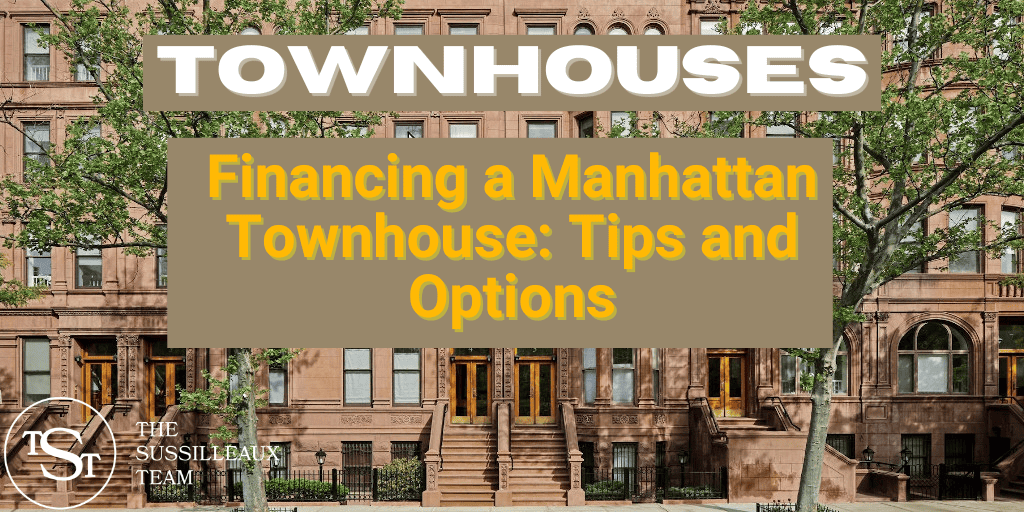Understanding the Basics of Townhouse Financing
Introduction
As a licensed associate real estate broker in New York City for over 20 years, I’ve been a part of hundreds of transactions of townhouses, condos, and co-ops. Most buyers finance their purchase, but what may not be obvious is that there are differences among the property types that make affect the financing process.
Key Differences between Financing a Townhouse and a Condo
Financing a Manhattan townhouse differs from financing a condo in several ways. Townhouses are typically classified as single-family homes, which often come with more favorable mortgage terms and interest rates compared to condos. Condos are generally considered a higher risk for lenders due to their shared ownership structure and the potential for fluctuating common charges or special assessments. However, townhouses may have higher purchase prices and property taxes, making it crucial to understand the financial implications before moving forward.
The Role of Credit Scores and Debt-to-Income Ratios
Credit scores and debt-to-income (DTI) ratios play a significant role in the mortgage application process. Lenders use credit scores to assess your creditworthiness and determine the interest rate on your loan. A higher credit score can lead to better mortgage terms and lower interest rates. DTI ratios represent your total monthly debt payments divided by your gross monthly income. Lenders prefer borrowers with lower DTI ratios, as it indicates a lower risk of default. Most lenders require a DTI ratio below 43%, but some may accept higher ratios depending on your credit score and financial history.
The Importance of Down Payments and Reserve Funds
Down payments and reserve funds are essential components of financing a Manhattan townhouse. A larger down payment reduces the amount you need to borrow, leading to lower monthly payments and interest costs. It can also help you avoid private mortgage insurance (PMI) and secure better mortgage terms. Lenders may also require reserve funds, which are savings set aside to cover several months of mortgage payments, property taxes, and insurance in case of financial hardship. Having sufficient reserve funds demonstrates your financial stability and commitment to the property.
Mortgage Options for Manhattan Townhouse Buyers
Conventional Loans
Fixed-Rate Mortgages
Fixed-rate mortgages have a constant interest rate throughout the loan term, offering stability and predictability in your monthly payments. These loans are well-suited for borrowers who plan to stay in their townhouse long-term or prefer the certainty of a fixed payment.
Adjustable-Rate Mortgages
Adjustable-rate mortgages (ARMs) have an initial fixed-rate period followed by periodic rate adjustments based on a reference interest rate. ARMs can offer lower initial interest rates compared to fixed-rate mortgages, but the rates may increase over time, leading to higher monthly payments. These loans are suitable for borrowers who expect to sell or refinance their townhouse before the adjustable-rate period begins.
Jumbo Loans
Jumbo loans are mortgages that exceed the conforming loan limits set by the Federal Housing Finance Agency (FHFA). Manhattan townhouses often have high purchase prices, making jumbo loans a common financing option. These loans typically have stricter underwriting requirements, including higher credit scores, lower DTI ratios, and larger down payments.
FHA Loans
Federal Housing Administration (FHA) loans are government-backed mortgages designed to help lower-income and first-time homebuyers. They offer lower down payment requirements and more flexible credit score criteria. However, FHA loans have limits on the loan amount, which may not cover the cost of a high-priced Manhattan townhouse. Additionally, borrowers must pay an upfront mortgage insurance premium and ongoing monthly premiums.
VA Loans
VA loans are mortgages backed by the Department of Veterans Affairs, available to eligible service members, veterans, and their surviving spouses. These loans offer competitive interest rates, no down payment requirements, and no PMI. However, there is a funding fee, which can be financed into the loan or paid upfront. As with FHA loans, VA loans have limits on the loan amount, and high-priced Manhattan townhouses may exceed these limits.
Navigating the Mortgage Application Process
Preparing Your Financial Documents
To ensure a smooth mortgage application process, gather and organize all necessary financial documents beforehand. These may include pay stubs, W-2 forms, tax returns, bank statements, investment account statements, and documentation of any other sources of income or assets. Having these documents ready can expedite the application process and help you secure a loan commitment more quickly.
Working with a Mortgage Broker or Lender
Choosing between a mortgage broker or a direct lender is an important decision. Mortgage brokers can help you navigate various loan options and find the best mortgage terms and rates for your situation. Direct lenders, such as banks or credit unions, offer loans directly to borrowers. Working with a direct lender can simplify the process and potentially save money on broker fees, but it might limit your loan options. Research both options and choose the one that best suits your needs and preferences.
Comparing Loan Offers and Interest Rates
Once you have gathered your financial documents and chosen a broker or lender, request loan estimates from multiple lenders to compare offers. Carefully review interest rates, loan terms, and fees, such as origination fees, discount points, and closing costs. This comparison can help you identify the most competitive offer and potentially save thousands of dollars over the life of the loan.
Locking in an Interest Rate and Securing a Loan Commitment
When you have selected a lender and a loan offer, lock in your interest rate to protect yourself from potential rate increases. This step ensures that your rate remains constant during the mortgage application process, providing peace of mind and stability in your monthly payments. After locking in your rate, work with your lender to secure a loan commitment, which is a conditional agreement stating that the lender will provide the mortgage under specific terms.
PRO TIP: In my experience many buyers call the bank they use for their everyday business and are happy to hear that as existing customers they qualify for a preferred rate with a discount off the bank’s retail mortgage products. While this sounds great, unfortunately it’s often the case that even the discounted rate is not competitive. They offer you this red herring because they think it will keep you from performing due diligence with other lenders. I ALWAYS recommend that you call several institutions besides your current bank.
Strategies for Strengthening Your Mortgage Application
Improving Your Credit Score
A higher credit score can lead to better mortgage terms and lower interest rates. To improve your credit score, make timely payments on your credit accounts, reduce your overall debt, and maintain low credit card balances. Regularly monitor your credit report and promptly address any errors or discrepancies.
Reducing Your Debt-to-Income Ratio
A lower DTI ratio can improve your mortgage application’s attractiveness to lenders. To reduce your DTI ratio, pay down outstanding debts, such as credit cards or personal loans, and avoid taking on new debt. You can also increase your income through a side job, freelance work, or a raise at your current job.
Increasing Your Down Payment
A larger down payment can help you secure better mortgage terms and avoid PMI. Save for a larger down payment by cutting expenses, setting up automatic savings transfers, and taking advantage of windfalls, such as bonuses or tax refunds.
Exploring Mortgage Points and Other Loan Features
Consider buying mortgage points to lower your interest rate. Mortgage points are prepaid interest paid at closing, with each point equal to 1% of the loan amount. The more points you buy, the lower your interest rate, but this strategy only makes sense if you plan to stay in the townhouse long enough to recoup the cost of the points. Evaluate other loan features, such as loan term and prepayment penalties, to find the best fit for your financial goals and preferences.
PRO TIP: The earlier you can start implementing these boosts to your credit, the better. If you’re even thinking about buying a property, now is the time to clean up your credit cards, consolidate spending, and purge unneeded credit cards. The longer your record is “clean”, the better.
Closing Costs and Additional Expenses
Understanding Closing Costs for Manhattan Townhouses
Closing costs include various fees and expenses associated with finalizing your mortgage, such as appraisal fees, title insurance, and attorney fees. In Manhattan, closing costs typically range between 2% and 5% of the purchase price. Be prepared to pay these costs at the closing, and request a closing disclosure from your lender before closing to review and understand all fees involved.
Budgeting for Property Taxes, Insurance, and Maintenance
In addition to your mortgage payment, plan for ongoing expenses such as property taxes, homeowners insurance, and maintenance costs. Property taxes in Manhattan can be substantial, so research the tax rates in your desired neighborhood and factor them into your budget. Homeowners insurance protects your investment and is often required by lenders. Maintenance costs can vary, but setting aside 1% to 2% of the property’s value annually for repairs and upkeep is a good rule of thumb.
Considering the Impacts of HOA Fees and Special Assessments
Although extremely rare, some Manhattan townhouses are part of homeowners associations (HOAs) that require monthly or annual fees to cover shared expenses, such as landscaping, maintenance, or amenities. Review the HOA fees and any potential special assessments before purchasing to ensure they fit within your budget. Additionally, consider the impact of these fees on your mortgage application, as they may affect your DTI ratio and loan eligibility.
Conclusion
Financing a Manhattan townhouse requires careful research, planning, and attention to detail. By understanding the various mortgage options, navigating the application process, and preparing for closing costs and ongoing expenses, you can make informed decisions and secure the best financing terms for your townhouse purchase. Working with experienced professionals, such as mortgage brokers, lenders, and real estate agents, can provide valuable guidance and support throughout the process.
Financing is a critical component of the purchase process. We offer our clients the years of experience, expertise, and trustworthiness that goes hand in hand with planning your purchase. We look forward to hear about your situation, and we are happy to help you in any way we can. Please give us a call or send us an email HERE.
Further Reading
You can return to The Complete Guide to Manhattan Townhouses, go to the preceding article; Manhattan Townhouse Pricing: What to Expect and How to Negotiate or read the next article in the buying a Manhattan townhouse series: Navigating the Manhattan Townhouse Market: A Step-by-Step Guide
Frequently Asked Questions (FAQs)
- Can I use a co-signer to help me qualify for a mortgage on a Manhattan townhouse?
- What is the typical down payment required for a Manhattan townhouse?
- How do interest rates differ between fixed-rate and adjustable-rate mortgages?
- Are there any first-time homebuyer programs available for Manhattan townhouse buyers?
- How can I estimate my monthly mortgage payment and other expenses for a Manhattan townhouse?
Can I use a co-signer to help me qualify for a mortgage on a Manhattan townhouse?
Yes, using a co-signer with a strong credit history and income can help you qualify for a mortgage or secure better loan terms. However, the co-signer becomes legally responsible for the mortgage payments if you default on the loan, so it’s essential to discuss the potential risks and responsibilities with your co-signer beforehand.
What is the typical down payment required for a Manhattan townhouse?
The typical down payment for a Manhattan townhouse ranges from 10% to 20% of the purchase price, depending on the loan type and lender requirements. Some government-backed loans, such as FHA or VA loans, may have lower down payment requirements, but these loans may not cover the full cost of high-priced Manhattan townhouses.
How do interest rates differ between fixed-rate and adjustable-rate mortgages?
Fixed-rate mortgages have a constant interest rate throughout the loan term, providing stability and predictability in your monthly payments. Adjustable-rate mortgages have an initial fixed-rate period followed by periodic rate adjustments based on a reference interest rate. ARMs can offer lower initial interest rates but may result in higher monthly payments if the rates increase over time.
Are there any first-time homebuyer programs available for Manhattan townhouse buyers?
Yes, there are various first-time homebuyer programs at the federal, state, and local levels that may provide down payment assistance, lower interest rates, or tax credits for eligible buyers. Research and apply for these programs to maximize your savings and affordability.
How can I estimate my monthly mortgage payment and other expenses for a Manhattan townhouse?
To estimate your monthly mortgage payment, use an online mortgage calculator and input your loan amount, interest rate, and loan term. For other expenses, such as property taxes and insurance, research local rates and consult with your real estate agent or lender. Remember to include maintenance costs and HOA fees, if applicable, in your budget to accurately estimate your total monthly expenses.





